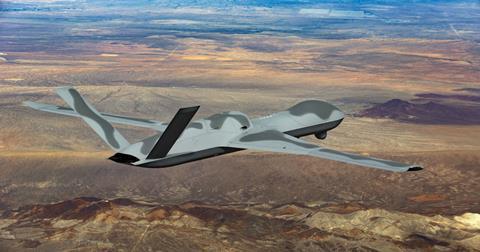General Atomics Aeronautical Systems (GA-ASI) and BAE Systems have teamed up to demonstrate new electronic warfare (EW) capabilities via a datalink using the MQ-20 Avenger unmanned air vehicle.
The work took place at GA-ASI’s Desert Horizon facility in El Mirage, California, says GA-ASI.

It saw the MQ-20 demonstrate “unique” EW capabilities remotely via a Link 16 datalink. The purpose was to advance electronic attack capabilities for future autonomous platforms.
“This effort featured novel mission system capabilities and the viability of autonomous payload control on our MQ-20,” says Mike Atwood, vice-president of advanced programmes at GA-ASI.
“We’re identifying key areas for improvement, while sharing investment and reducing risk.”
BAE provided “customised mission technology” as well as a multifunctional processor and a Link 16 terminal.
The system can jam threats autonomously and under the control of an operator. EW is seen as a key mission for the future fleet of collaborative combat aircraft (CCA) that the US Air Force plans to deploy alongside manned fighters.
CCAs are envisaged using EW to supress enemy air defences, allowing other CCAs or manned aircraft to strike objectives.
“We are working closely with General Atomics to highlight the maturity of autonomous EW mission systems in support of US Air Force objectives,” says Scott Bailie, director of advanced electronic warfare solutions at BAE.
“We are combining proven EW technology and secure command and control on a rapid timeline in a small form factor well-suited for CCAs.”
Link 16 is the system used by the USA and other NATO members to facilitate secure communications between aircraft, naval ships and ground-based systems, and is seen as a capability essential to the integration of future autonomous fighters.
A recent US Marine Corps test saw Lockheed Martin F-35Bs collaborate with a Kratos XQ-58 Valkyrie via Link 16. This work focused on the ability of the Valkyrie to collect and deliver sensor data.


























